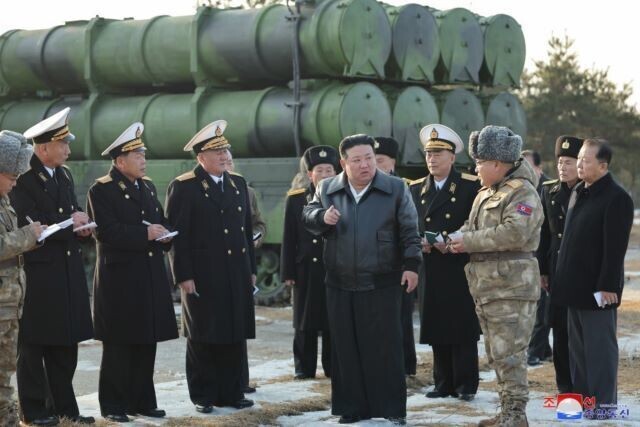hankyoreh
Links to other country sites 다른 나라 사이트 링크
[Column] North and South Korea may no longer be a single nation — but must they be enemies?


By Pak Noja, (Vladimir Tikhonov), professor of Korean Studies at the University of Oslo
For the past three months, North Korean leader Kim Jong-un has been making some shocking statements about inter-Korean relations.
Late last year, he declared that relationship to be “relations between two states hostile to each other.” In a dramatic break from predecessors Kim Il-sung and Kim Jong-il’s focus on reunification, he also recognized the idea of “two Koreas,” something that North Korea has heretofore strenuously denied.
Last month, he declared in a policy speech that North Korea “cannot go along the road of national restoration and reunification together with the ROK clan that adopted as its state policy the all-out confrontation with our Republic [. . .] and lost compatriotic consciousness.” He further called for taking “other measures so as to completely eliminate such concepts as ‘reunification,’ ‘reconciliation’ and ‘fellow countrymen’ from the national history of our Republic.”
In accordance with this, he eliminated various institutions that had been performing duties related to the South and even formally abolished the use of terminology presuming consanguinity between South and North, including “samcholli kumsu kangsan” (“land stretching for 3,000 ri”) and “palchonman kyore” (“nation of 80 million compatriots”).
Given that the North Korean regime has regarded reunification of the national territory as its primary task from the outset, this amounts to an ideological revolution in a society where ideas are the lifeblood. What prompted its leader to make the decision to part ways with the South forever, and how does he plan to tend to his public’s welfare going forward?
Three factors appear to have played a part in the announcement of a permanent separation between South and North: Pyongyang’s bitter experiences in its history of inter-Korean relations to date, philosophical changes in South Korean society, and predictions regarding the global political situation. Let us consider each of these factors individually.
The Sunshine Policy, as exemplified by the June 15 South–North Joint Declaration between then-South Korean President Kim Dae-jung and Kim Jong-il in 2000, promised rosy visions of the future, but the economic results were unimpressive compared with initial expectations.
The Hyundai Group was the only major South Korean corporation to take part actively in economic cooperation with the North, and its tourism venture at Mount Kumgang performed consistently in the red. Major corporations similarly declined to take part in the Kaesong Industrial Complex.
The North Korean employees at the small South Korean companies working in the complex earned around US$150 a month in wages — a relatively high amount compared with countries like Bangladesh or Cambodia, which did not carry the same sorts of political burdens as the North.
In an era of neoliberalism, where short-term profitability is valued over long-term prospects of “building a shared national economy,” South Korean businesses saw little to hope for from economic cooperation with the North, which carried a major risk burden with only limited potential rewards. Words like “nation” and “reunification” may have sounded impressive, but by the time inter-Korean relations really began to sour in 2010, South Korea only represented around half of what China did as a proportion of the North’s external trade, and that gap was already growing.
South Korean businesses never did succeed in building a sustainable model for inter-Korean economic cooperation in a neoliberal era. In contrast, the state-driven capitalist system in China had a relatively easy time bringing the North under its influence as a source of resources and relatively low-wage labor.
Kim’s reference to the South having “lost compatriotic consciousness” may sound harsh, but from the standpoint of a North Korean leader, anger toward South Korean bureaucratic groups and politicians might seem justified.
The South has failed to establish long-term consistency in its policies, with the administrations of Lee Myung-bak and Park Geun-hye rolling back the economic cooperation measures implemented under the Kim Dae-jung and Roh Moo-hyun presidencies.
Additionally, South Korea’s hard-line conservatives have been taking on more and more of a “new right” quality since the 2010s. In the eyes of the new right, the Japanese empire — which Kim Jong-un’s grandfather Kim Il-sung had battled against — is something to be grateful for, as it sowed the seeds of capitalist civilization on the Korean Peninsula. For North Korea, which has rejected market capitalism and friendliness with the US, it represents an absolute evil.
The current South Korean administration, which is strongly new right in its leanings, has shown itself to be decidedly intolerant in ideological terms, to the point where it stigmatizes a national hero like General Hong Beom-do due to his history of communist affiliation.
Even liberal politicians with relatively moderate views toward Pyongyang have found themselves with limited room to maneuver and with a generally clearer sense of affiliation with the US side in the deepening conflict between Washington and Beijing. The Moon Jae-in administration was quite proactive early on with summits and other attempts to improve relations with the North — but under pressure from the US’ denuclearization-centered agenda, it ended up unable to accomplish much at all in terms of practical cooperation.
In a South Korea that has become generally more conservative, where militant right-wingers have transformed into the “new right” and the forces of liberalism have been increasingly cowed, young people in particular have shown fading perceptions when it comes to North Korea and reunification.
A survey of South Koreans by KopraLab last year showed 67% of respondents in their 20s and 30s naming the US as their favorite foreign country, while 61% said they did not view reunification as absolutely necessary. Eighty-eight percent expressed unfavorable attitudes toward North Korea.
Not just for businesspeople and bureaucrats, but for a majority of South Koreans who see themselves already as citizens of a wealthy first-world country, North Korea issues are no longer a focus of interest. In light of this situation, the “farewell” message from the North Korean leadership seems to make some sense.
Another factor in North Korea’s decision to go a fully separate path from the South may have been its determination that it would not do so entirely on its own.
At present, North Korea seems to hold an optimistic view that Russia and pro-Iranian forces are achieving relative success in their battles against the US and pro-US forces in Ukraine and the Middle East. It also appears to be anticipating that the conflict between Western powers such as the US and European powers such as China, Russia, and Iran will continue well into the future.
Amid these long-term frictions, it seems to have determined that it can get enough of the capital, investment, technology, and tourists it needs through its relationship with China, Russia, and Iran. In that sense, it appears to be expecting no major issues in sustaining itself economically with the South.
As the analysis above shows, Kim Jong-un’s potentially shocking remarks about the South represent the North Korean leadership’s overall assessment of the way inter-Korean relations have played out to date, as well as a long-term strategy for a North Korean future without the South.
But even if South and North are no longer compatriots seeking a path toward reunification, there is no need for them to be “enemies.”
The “relations between two states hostile to each other” that Kim Jong-un described is primarily a reference to the policies of the Yoon Suk-yeol administration, which has gone all in on military cooperation with the US and Japan while effectively abandoning any attempts to approach the North. But even these policies will end up being revised at some point, and the South Korean government will be obliged to pursue normalization of its relationship with Pyongyang.
South and North Korea are both carving out lives for themselves on a narrow peninsula. Even if they have now parted ways forever, acknowledging the differences and the essentially irreversible divide between them, they still need to seek out ways of coexisting as good friends who do not fight.
Please direct questions or comments to [english@hani.co.kr]

Editorial・opinion
![[Guest essay] Preventing Korean Peninsula from becoming front line of new cold war [Guest essay] Preventing Korean Peninsula from becoming front line of new cold war](https://flexible.img.hani.co.kr/flexible/normal/500/300/imgdb/original/2024/0507/7217150679227807.jpg) [Guest essay] Preventing Korean Peninsula from becoming front line of new cold war
[Guest essay] Preventing Korean Peninsula from becoming front line of new cold war![[Column] The state is back — but is it in business? [Column] The state is back — but is it in business?](https://flexible.img.hani.co.kr/flexible/normal/500/300/imgdb/original/2024/0506/8217149564092725.jpg) [Column] The state is back — but is it in business?
[Column] The state is back — but is it in business?- [Column] Life on our Trisolaris
- [Editorial] Penalties for airing allegations against Korea’s first lady endanger free press
- [Editorial] Yoon must halt procurement of SM-3 interceptor missiles
- [Guest essay] Maybe Korea’s rapid population decline is an opportunity, not a crisis
- [Column] Can Yoon steer diplomacy with Russia, China back on track?
- [Column] Season 2 of special prosecutor probe may be coming to Korea soon
- [Column] Park Geun-hye déjà vu in Yoon Suk-yeol
- [Editorial] New weight of N. Korea’s nuclear threats makes dialogue all the more urgent
Most viewed articles
- 1Yoon’s broken-compass diplomacy is steering Korea into serving US, Japanese interests
- 2[Guest essay] Preventing Korean Peninsula from becoming front line of new cold war
- 360% of young Koreans see no need to have kids after marriage
- 4[Reporter’s notebook] In Min’s world, she’s the artist — and NewJeans is her art
- 5S. Korean first lady likely to face questioning by prosecutors over Dior handbag scandal
- 6Lee Jung-jae of “Squid Game” named on A100 list of most influential Asian Pacific leaders
- 7After 2 years in office, Yoon’s promises of fairness, common sense ring hollow
- 8AI is catching up with humans at a ‘shocking’ rate
- 9Hybe-Ador dispute shines light on pervasive issues behind K-pop’s tidy facade
- 10Japan says it’s not pressuring Naver to sell Line, but Korean insiders say otherwise